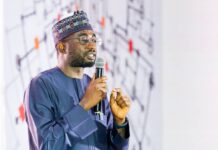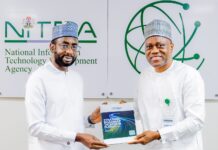Pantami: One Year of Digital Economy Ministry And The Pathway To National Development
By Inyene Ibanga
TECH DIGEST – The 23rd day of October, 2019 is going to remain a memorable day in the history of the Federal Ministry of Communications and Digital Economy.
On that day, President Muhammadu Buhari granted approval for the former Ministry of Communications to be renamed Ministry of Communications and Digital Economy. He noted that the renaming is in line with global best practice, which will further reflect the priorities of his administration.
Evidently, the renaming was to allow the minister, Dr. Isa Ali Ibrahim Pantami to reposition and empower the Ministry to fulfill its Digital Economy objectives. This further expanded its mandate to capture the goals of digitalisation and diversification of the Nigerian economy, in line with the demands of the Economic Growth and Recovery Plan (EGRP), one of the key agenda of the present administration.
In his request for renaming the Ministry, Pantami noted that the change of nomenclature would propel the Ministry to reposition its strategic objectives towards accelerating the growth of a digital economy in Nigeria.
Historically, author Don Tapscott first coined the term Digital Economy in his book, The Digital Economy: Promise and Peril in the Age of Networked Intelligence, published in 1995.
The term, also known as the Web Economy or Internet Economy, is defined as an economy that focuses on digital technologies and applications, and involves all economic transactions and activities that occur on the internet, whether personal, business, social, and cultural.
The digital economy encompasses the artificial intelligence infrastructure, the Internet of Things, augmented and virtual reality, big data, cloud computing, blockchains, robotics and autonomous vehicles. Hence, the term also describes the impact of digital technologies on patterns of production and consumption.
Producers and consumers are witnessing an ever-increasing number of digital platforms which greatly influence our lives and the way we do things. These digital technologies have integrated the critical aspects of our lives such as healthcare, education, banking, entertainment, agriculture, immigration, transport, defence and security, among others.
Unarguably, the digital economy is developing rapidly worldwide as the single most important driver of innovation, competitiveness and growth. Many advanced and emerging countries are adopting the digital economy as the most productive pathway for development. It is believed to hold enormous potentials for entrepreneurs, small- and medium-scale enterprises, especially start-ups, across all sectors of national economies.
New digital trends such as cloud computing, mobile web services, smart grids, and social media, are radically changing the business landscape, reshaping the nature of work, and the boundaries of enterprises.
These trends do not only facilitate technological innovation, they spur innovation in business models, business networking and the transfer of knowledge and access to international markets. Thus, local business operators are able to access the international markets through the deployment of relevant digital technologies.
Already several African countries like Tunisia, Ghana, Benin Republic, and South Africa, among others, are gradually integrating digital technologies into their traditional economies and emerging as digital economies.
In Nigeria, the Ministry of Communications and Digital Economy is mandated to create and formulate policies that will propel the country’s drive towards a digital economy. It has the responsibility to promote and facilitate ICT as a key tool in the transformation agenda of the country in the areas of job creation, economic growth and transparency of governance.
Read Also:
Critical sectors of the economy include health, education, agriculture, security, banking, transportation, power and energy, and the Ministry is at the forefront of encouraging every sector to effectively and efficiently deploy IT in order to enhance sustainable growth.
Digital entrepreneurship is another strategic area of focus for the Ministry, as this involves the provision of policies and infrastructure to support and encourage digital creativity and innovation among the people, especially the teeming youth demographic.
The Ministry of Communications and Digital Economy will clock one year on October 23. It won’t be out of place for the Ministry to do a self-assessment on its performance, in line with the Digital Economy objectives of the Federal Government, so far.
Foremost among the Ministry’s ambitious initiatives is the Digitalise Nigeria Programme, launched by President Buhari on March 19, with the objective of providing options for the digital training of Nigerians.
As a matter of fact, the president underscored the essence of the Digitalise Nigeria Programme to the country’s digital economy objective by identifying it as “one of Federal Government’s key initiatives that will empower innovators and entrepreneurs with skills required to thrive in our emerging digital economy”.
This goal attained an important level of reality when the Federal Government partnered the African Development Bank and Microsoft to launch Digital Nigeria eLearning Platform. The platform will provide marketable skills to the country’s youth.
The platform offers courses in web development, content creation, and data science, among others. Currently, close to 6,000 enrollees have completed at least one training course and earned a certification. In addition, the AfDB’s Coding for Employment initiative is geared to build linkages between the public and private sectors to create millions jobs in Nigeria’s digital economy in the next ten years.
In line with its commitment to successfully advance the digital economy, the Ministry is partnering with a number of institutions to enable Nigerians acquire cutting edge digital skills from the comfort of their homes. It is collaborating with IBM as part of the IBM Digital Nation Africa programme to provide Nigerians with over 280 hours of free learning and nearly 90 courses on key emerging technologies.
Interestingly, one of the highpoints of the Ministry’s celebrations commemorating Nigeria’s 60th independence anniversary, was the formal launch of the Digital Nigeria Portal and Mobile App. The Portal forms a part of the implementation of the National Digital Economy Policy and Strategy (NDEPS) for a Digital Nigeria.
Through the Digital Nigeria programme, Nigerians will be empowered to develop skills and build innovative solutions to tackle challenges within the economy.
A large pool of highly skilled and competent digital technology experts is crucial to the actualisation of the nation’s effort at transforming into a digital economy. Creativity and innovation remain the bedrock for sustainable economic growth through the sector. From the forgoing, I strongly believe that the Ministry of Communications and Digital Economy has shown substantial commitment to developing the capacity of Nigerians to use technology to solve problems.
The Ministry should be applauded for the sterling works that the National Information Technology Development Agency (NITDA), Nigerian Communications Commission (NCC) and to some extent the Nigerian Postal Service (NIPOST) is doing to further propel the digital economy. However, the other agencies under its supervision need to be proactive and come up with creative ways of further impacting on the economy.
As the Ministry turns one year on October 23, I enjoin the minister and his management team to remain consistent in their drive to ensure the effective implementation of strategies for the attainment of a robust digital economy in Nigeria. They should forge ahead and encourage the Ministry’s leading agencies not to relent in their commendable performances.
One year may not be the best timeframe to appraise the performance of the Ministry of Communications and Digital Economy under the watch of the goal-getting, Dr. Isa Ali Ibrahim Pantami, but it leaves one optimistic and hopeful that there would be much morefor the Ministry and Nigerians to celebrate come next year.
Inyene Ibanga is Managing Editor TechDigest and writes from Wuye District Abuja




















